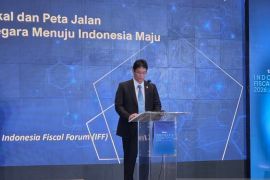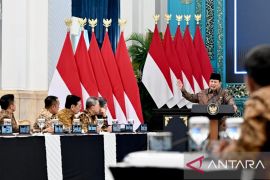It is hoped that in the third quarter it (the economy) can improve, with a prediction of minus two, minus one (percent growth), or even, we hope to be positiveJakarta (ANTARA) - The Indonesian government is making efforts to accelerate the absorption of the budget prepared by it, including the funds allocated for the National Economic Recovery (PEN) program, to boost economic growth.
The government has so far spent Rp1,000 trillion of the Rp2,700-trillion budget, and intends to utilize the remaining Rp1,700 trillion by the end of this year.
There is a need to spur budget absorption to boost growth in the third quarter of 2020 after the negative growth of 5.32 percent seen in the second quarter, said Coordinating Minister for Economic Affairs, Airlangga Hartarto, at the 2020 Work Meeting and National Consultation of the Indonesian Employers' Association (Rakerkonas Apindo), which was broadcast online on Wednesday.
“This third quarter is the determinant for us. From the Rp2,700 trillion prepared under the budget, including the PEN budget, until June, the government has spent Rp1,000 trillion. In the third-fourth quarter, we expect to spend Rp1,700 trillion, that is Rp700 trillion in the third quarter and Rp1,000 trillion in the fourth quarter,” he informed.
Related news: Industry Minister optimistic on economic rebound in Q3 2020
Related news: Fundamentals of Indonesia's economy still good amid outbreak: CORE
Airlangga said this effort is being carried out in accordance with President Jokowi's directions. It is expected that by spurring government spending in each ministry, the economy could return to a positive growth path.
Although Indonesia's economy has recorded negative growth — from the consumption side and government spending to the decline in exports and imports, there are still a number of sectors that are growing positively amid the ongoing slowdown.
Positive growth has still been recorded in the information and telecommunications, water utilities, health services, real estate, agriculture, educational services, and financial services sectors.
Meanwhile, the sectors that have been hit the hardest by the pandemic are accommodation, food and beverage, and land, sea, and air transportation.
"The accommodation, food and beverage, and transportation sector is the government's (current) concern. Because the chair of Apindo is also the chairman of PHRI (Association of Indonesian Hotels and Restaurants), maybe we need to discuss the stimulus that needs to be provided in this sector, because the spending is also domestic. It must be encouraged,” Hartarto said.
Indonesia, he noted, was also one of the few countries whose economic growth was still positive in the first quarter of 2020.
Meanwhile, in the second quarter of this year, other economies fell considerably, for example, Britain showed minus 19 percent, Germany minus 11 percent, France minus 19, Japan minus 8 percent, South Korea minus 2.9 percent, and India minus 18 percent growth.
"If we look at several countries that have implemented a lockdown, (we will find) their economy has been affected more deeply," the minister said.
Airlangga said that as per projections made by various institutions, Indonesia's economy is expected be on a green or positive path in 2021. He then asked for support from stakeholders, including the business world.
Earlier, Airlangga had predicted that Indonesia's economy would grow by minus 0.49 percent in 2020 in wake of the COVID-19 pandemic.
“It is hoped that in the third quarter it (the economy) can improve, with a prediction of minus two, minus one (percent growth), or even, we hope to be positive,” he said at the virtual launch of the Coalition for Action against Corruption (CAC) Indonesia in Jakarta on Tuesday (August 11, 2020).
In his presentation on the economic growth of countries, including Indonesia, the Coordinating Minister had estimated that Indonesia's economy in the third quarter of 2020 would reach minus 1 percent growth.
In the fourth quarter of 2020, economic growth is estimated to improve to a positive growth of 1.38 percent, so the forecast for this year is a negative growth of 0.49 percent.
Related news: Indonesian economy to contract 0.49 percent this year: minister
Related news: Jokowi optimistic of Indonesia's economy showing positive trend in Q3
Translator: Ade Irma, Azis Kurmala
Editor: Mulyo Sunyoto
Copyright © ANTARA 2020












